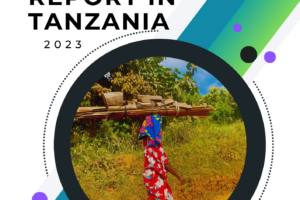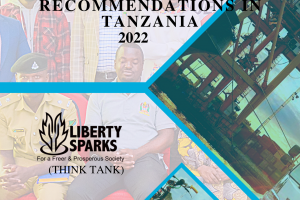
Improved Economic Freedom Report 2022.
Introduction
Fraser Institute report (2021), the index published in Economic Freedom of the World measures the degree to which policies and institutions of countries are supportive of economic freedom. The structure of economic freedom world index measures the degree of economic freedom present in five broad areas, namely; Size of Government; Legal System and Property Rights; Sound Money; Freedom to Trade Internationally, and Regulation. The demonstrated economic benefits of economic freedom has led to increased openness to trade and other market-oriented reforms across developing countries, in post-Soviet Eastern Europe, and even in advanced economies. The economic freedom index report has put Tanzania in the third quantile with countries such as Kenya, Rwanda, Zambia, South Africa, Botswana, Nigeria, and Namibia. In this report, Tanzania was rated 6.75 and ranked 97 out of 165 countries. In Sub-Sahara Africa, Tanzania is ranked eighth out of 47 countries and its overall score is above the Regional average, though it is below the world average. The report has emphasized that economic freedom has a substantial impact on eliminating poverty and improving the well-being of Tanzanians.
Objective and Methodology
The broad objective of this study is to analyze the recently released Fraser Institute report of the “World Economic Freedom Index”, and conduct an analysis to audit the “Improved Tanzania Economic Freedom Index 2021. The study adopted mixed research methods to conduct this assignment. The qualitative research method was adopted to collect information from appropriate documents and selected respondents. In this assignment, both primary and secondary data were collected and analyzed. Secondary sources were sought, primarily from a review and analysis of the 2021 World Economic Freedom Index that was released by the Fraser Institute. For the purpose of this study, four broad areas of economic freedom are covered, namely; Legal systems and Property Rights, Sound Money, Freedom to Trade Internationally, and Regulation. The exercise leading to completion of this assignment involves carrying out round tables discussions and incorporating the relevant inputs into the policy formulation processes in Tanzania and producing a high-level Tanzania improved economic freedom index and policy paper to be presented to policymakers.
Key Findings
- Insights from the literature have indicated that economic freedom leads to economic growth and wellbeing. However, the findings on the positive relationship between economic freedom and growth and wellbeing are not without exceptions. The implication is that there must be other factors at play in specific contexts.
- Tanzania performance on the legal system and property rights remained relatively the same with the highest being in 2017 at 5.57 and the lowest being 5.3 in 2019. The judicial independence was 5.29 and 5.4 in 2018 and 2019 respectively. However, there was a general decline for Tanzania in the legal system and property rights. The decline was partly attributed to the amendments of miscellaneous laws that reduced property rights for landowners. It also led to the decline of independence in the judicial system, as the executive branch of the government became predominant riding roughshod over other branches during the 2016-20 period. . During the 2016-20 period there was progressive decline of respect for the constitution or law as exhibited by firing senior civil servants in public meetings contrary to public service regulations and the lengthening list of unbailable offences under the notorious Money Laundering Act that covered cases of the government’s political opponents and critical journalists.
- The constitution of the United Republic of Tanzania prohibits all forms of discrimination. Women rights are constitutionally guaranteed but not uniformly protected. Despite the presence of these progressive pieces of law, including the mother laws that protect women’s rights in Tanzania, there are still challenges that women are facing. A sizeable number of women are unable to realize their right to own land and other property due to a lack of awareness of these laws and challenges of enforcement. A major barrier to female property rights is the presence of customary laws, practices, inheritance practices, traditions and norms that deny women rights to own property.
- The score in sound money has been respectable at over 9.0. Credit provided to the private sector is promising. A reflection of sustained accommodative monetary policy and improving business conditions. Inflation has been stable as indicated by its level and standard deviation.
- Banks and financial institutions are allowed to provide access to foreign currency facilities to residents in respect of all current account payments and this has maintained at a high score through the period 2015-2019 because during the period there was no alteration in Government regulation in respect of ownership and operating foreign currency bank accounts.
- There has been minimal variation in freedom to trade internationally during the period 2015-2019. This is an indication of stability of government policy on regulations governing international trade. However, the score for revenue from trade taxes declined steadily from 8.82 in 2015 to 7.34 in 2019. The findings revealed, Tanzania performed poorly on the management of trade barriers and regulations, with the score being 2.91 in 2019, which was far less than average
- Non-tariff barrier (NTBs) to trade recorded a score of 4.82 in 2016 rising to 5.03 in 2019 while the compliance costs of importing and exporting remained unchanged at 0.80. Black market remained the same score 10.00 though out the year in question. This was the same with the freedom of foreigners to visit Tanzania.
- In credit regulations, Tanzania is 58th. This means that businesspersons and entrepreneurs have unnecessary difficulty in obtaining credit to start or expand a business and create jobs and prosperity. Tanzania was ranked 13th out of 15 countries in Sub Saharan Africa for credit accessibility. As an emerging market, many enterprises in Tanzania have struggled with restricted credit access, and 70 per cent of all Tanzanian SMEs, have no formal credit access at all. In fact, only 15 per cent of the population has formal access to credit through banks.
- The lack of credit does not mean that Tanzanians are not borrowing money, as over half of those in the labour market have taken loans at some point. Many Tanzanians use mobile money platforms.
- The analysis of performance through Fraser Institute has indicated that, the credit market regulation score in 2017 was 7.84, while the figure increased by 0.32 in 2018 with 8.18, the score was stabilized with same performance in 2019. The score demonstrate that currently. In the wake of the pandemic, BOT continued to take a series of policy measures to bolster the banking sector, including cutting the discount rate from 7.0% to 5.0% and reducing the statutory minimum reserves (SMR) requirement from 7.0% to 6.0% effective from 8th June 2020, to support the increase in market liquidity. Despite a global decline in financial credit and growth in 2020 due COVID-19, Tanzania banking sector remained resilient growing at 4.1% in the year. Digital banking services continue to expand driven by increasing financial inclusion and mobile penetration rate.
- The study findings on the performance of interest rate control (negative real interest rates) shows that Tanzania was able to control interest at a constant rate from 2015 to 2017 with the performance of 10 declining moderately to 9
- Residents enjoy some basic freedoms pertaining to travel and changes of residence, employment, and education especially those originating from Partner States of the EAC regional block where the Common Market Protocol, applying to free movement of labour, is being implemented though not fully.
Recommendations
- Initiatives should be taken to achieve the key indicators of economic freedom.
- The slippages that have been observed in performance on the legal system and property rights deserves special attention by reviewing the amendments that were made of miscellaneous laws that reduced property rights or led to the decline of independence in the judicial system.
- Property rights to women should be promoted through raising the level of awareness of laws and enhancing enforcement mechanisms.
- The regulatory trade barriers that were tightened in the last five years should be relaxed.
- Accelerate the pace of tightening up banking supervision and encouraging industry consolidation and continue to expand digital money, financial inclusion and improve private lending while reducing the incidence of non-performing loans.
- Regulating the labour market should balance between enabling decent working conditions and incomes for employees.
- Implementation of the Common Market Protocol, applying to free movement of labour, should be accelerated and progress monitored based on relevant basic freedoms.



Statement: A Peaceful, Freer and Prosperous Africa can Defeat Coups- African Think Tanks